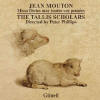Texte paru dans: / Appeared in:
*

GRAMOPHONE (Awards Issue 2012)
Pour s'abonner /
Subscription information
Gimell
CDGIM047

0755138104723
(ID262)
Consultez toutes les évaluations recensées pour ce cd
~~~~ Reach all the evaluations located for this CD
Reviewer: Fabrice Fitch
The Scholars shine a light on the man
in Josquin’s shadow
The more one hears Mouton’s music, the stranger seems the
oft-quoted description of him by a l6th-century theorist as the ‘happy
emulator’ of Josquin. For a start, Mouton’s wonderfully poised invention
seems more expansive and discursive, even when writing in canon. Now that it
seems that the two were far nearer in age than was once believed, the idea
of an inspired follower is less credible. Surely the time has come for
Mouton to step out of his contemporary’s shadow. That a second monographic
disc should appear in as many months should help his cause no end.
The centrepiece here is the Mass Dictes moy toutes vos pensées, based on a song by Compère. Imposing and delicate by turns, some of its more truculent details (the reduced-voice Agnus II for three bass voices, for instance) may be a tribute to Compère’s searching cast of mind. The top tune is taken by an alto (Caroline Trevor) and a countertenor (Patrick Craig), a combination which, in terms of tone and balance, has served the Tallis Scholars admirably well recently. The motets reveal the composer’s consummate versatility: the double-choir canon Nesciens mater has had many an outing but the canon in the short Ave Maria. . .Benedicta tu is in its own way just as impressive. In expressive terms, too, contrast the genial Ave Maria. . . Virgo serena with Quis dabit oculis, the lament for Mouton’s royal patron, Anne of Brittany. Much as one might wish that the music were treated more dynamically at times, all this gives an admirably rounded view of Mouton.
But it’s a shame that we only hear a single
stanza of Compère’s rondeau — which survives complete in several sources — so
that the rondeau is shorn of the repeats that the form requires. Speaking of
repeats, it’s unfortunate, too, that the producers reuse the same take or takes
for the second statement of the ‘Hosanna’ in the Sanctus.
Cliquez l'un ou l'autre
bouton pour découvrir bien d'autres critiques de CD
Click either button for many other reviews


